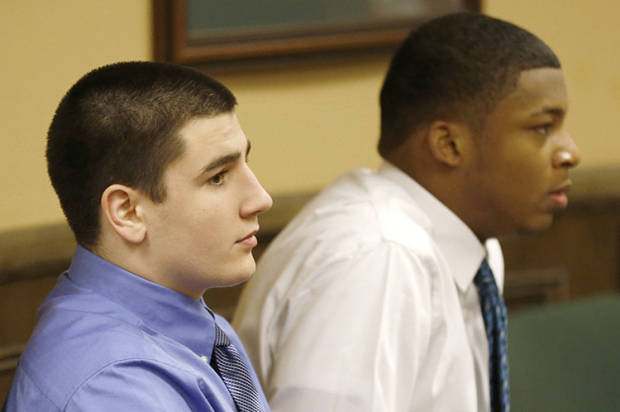Thanks to a trial overseen by a juvenile court judge, justice in
Steubenville was administered remarkably quickly. On Sunday morning,
Trent Mays and Ma’lik Richmond were found delinquent of
the rape of a sixteen-year-old girl, for which they will serve,
respectively, a minimum of two years and one year each. But this isn’t
the end of the story, which went national with the help of Anonymous but
was truly laid bare in the four days of testimony last week.
The only unique aspect of the story was its prominence and the abundant, inarguable recorded evidence, so it’s worth taking stock of what those factors tell us about rape in America:
1. They thought they could get away with it. The release of text messages sent that night and immediately afterwards make it clear that at least some of these kids, particularly Trent Mays, knew what had happened was wrong. It’s just that they had reason to believe they would operate with impunity. One teen texted Mays the next day, “You’re a felon.” Mays subsequently said, “I shoulda raped now that everybody thinks I did.” (He had at one point said he’d had intercourse with the girl, then said he didn’t; digital penetration is rape under Ohio law.) But Mays’ damage control is telling: In a text, he referred to football coach Reno Saccoccia: “I got Reno. He took care of it and shit ain’t gonna happen, even if they did take it to court.” Mays also said that the coach said that next time they got into trouble, they’d be suspended for three games. ”But I feel he took care of it for us,” Mays wrote. “Like, he was joking about it, so I’m not worried.” Unluckily for Mays, the coach wasn’t quite as powerful as believed.
2. The bystanders could have prevented it. One of the witnesses, Evan Westlake, wasn’t drunk, and when he realized one of his friends was too drunk to drive, Westlake tricked him into handing over his keys. Yet as Yahoo News’ Dan Wetzel points out, Westlake didn’t think to intervene in the same way when he saw the girl passed out on the floor being violated by Mays and Richmond. (On Sunday, Ohio Attorney General Mike DeWine said he would ask for a grand jury to investigate whether there would be further charges.)
Original Article
Source: salon.com
Author:Irin Carmon
The only unique aspect of the story was its prominence and the abundant, inarguable recorded evidence, so it’s worth taking stock of what those factors tell us about rape in America:
1. They thought they could get away with it. The release of text messages sent that night and immediately afterwards make it clear that at least some of these kids, particularly Trent Mays, knew what had happened was wrong. It’s just that they had reason to believe they would operate with impunity. One teen texted Mays the next day, “You’re a felon.” Mays subsequently said, “I shoulda raped now that everybody thinks I did.” (He had at one point said he’d had intercourse with the girl, then said he didn’t; digital penetration is rape under Ohio law.) But Mays’ damage control is telling: In a text, he referred to football coach Reno Saccoccia: “I got Reno. He took care of it and shit ain’t gonna happen, even if they did take it to court.” Mays also said that the coach said that next time they got into trouble, they’d be suspended for three games. ”But I feel he took care of it for us,” Mays wrote. “Like, he was joking about it, so I’m not worried.” Unluckily for Mays, the coach wasn’t quite as powerful as believed.
2. The bystanders could have prevented it. One of the witnesses, Evan Westlake, wasn’t drunk, and when he realized one of his friends was too drunk to drive, Westlake tricked him into handing over his keys. Yet as Yahoo News’ Dan Wetzel points out, Westlake didn’t think to intervene in the same way when he saw the girl passed out on the floor being violated by Mays and Richmond. (On Sunday, Ohio Attorney General Mike DeWine said he would ask for a grand jury to investigate whether there would be further charges.)
Original Article
Source: salon.com
Author:Irin Carmon

No comments:
Post a Comment